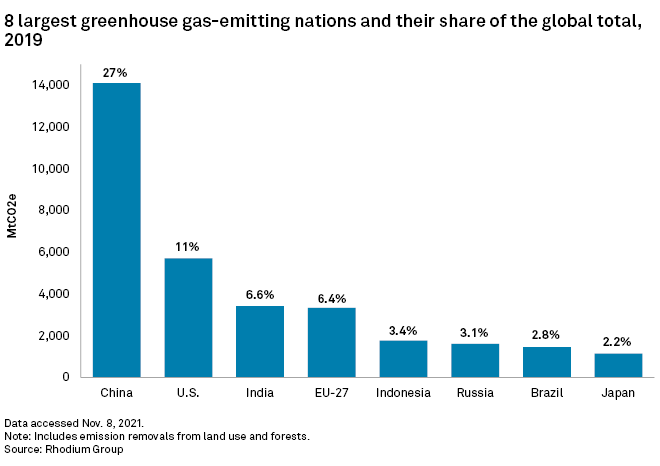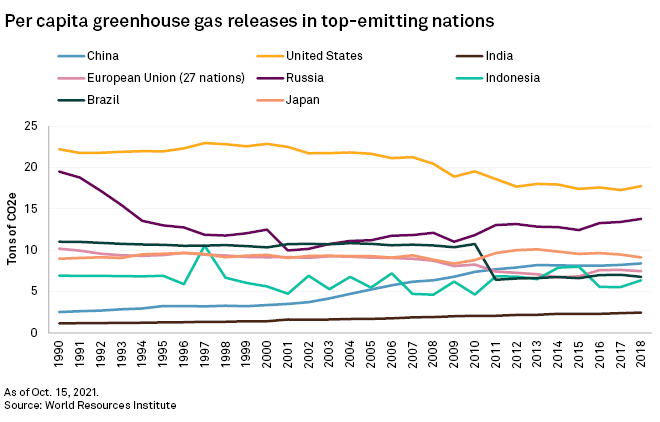S&P Global Offerings
Featured Topics
Featured Products
Events
S&P Global Offerings
Featured Topics
Featured Products
Events
S&P Global Offerings
Featured Topics
Featured Products
Events
Banking & Capital Markets
Economy & Finance
Energy Transition & Sustainability
Technology & Innovation
Podcasts & Newsletters
Banking & Capital Markets
Economy & Finance
Energy Transition & Sustainability
Technology & Innovation
Podcasts & Newsletters
S&P Global Offerings
Featured Topics
Featured Products
Events
10 Nov, 2021
By Karin Rives

| COP26 activists dressed as world leaders sit on a raft in a Glasgow canal. Many climate action groups have taken to the streets in recent days to demand that government leaders make more progress. Source: Jeff J. Mitchell/Getty Images News via Getty Images |
The world's eight largest emitters account for nearly two-thirds of all greenhouse gases that humans spew into the atmosphere, and all those nations are falling short of meeting their net-zero emission pledges, climate researchers warned.
A key goal of the COP26 climate summit in Glasgow, Scotland, now in its second and final week, was to keep the global temperature rise of 1.5 degrees C above preindustrial levels "within reach." The high-stakes summit was the first time nations would assess progress after signing the 2015 Paris Agreement on climate change. Importantly, countries were expected to arrive at COP26 with new carbon reduction goals for 2030 that would keep them on track to decarbonize by midcentury.
But with only a few days left at the summit, concern is growing over the massive gap between what nations plan to do to slow emissions by 2030 and what is needed to keep warming within the 1.5-degree limit.
Efforts by the top-emitting nations — China, the U.S., India, the European Union, Indonesia, Russia, Brazil and Japan — all range from "insufficient" to highly or critically insufficient, a new analysis by the Climate Action Tracker shows. A separate United Nations report released Nov. 9 concluded that even if official climate pledges known as Nationally Determined Contributions, or NDCs, were implemented, warming by the end of the century could reach 2.7 degrees, far above the Paris targets.
"Not a single country has short-term policies in place to put itself on track toward its own net-zero target," said Niklas Höhne with the NewClimate Institute, one of the organizations behind the Climate Action Tracker. "We would in 2030 be emitting twice as much as we should if we want to [reach] 1.5 degrees."
A look at the pledges that the seven top-emitting nations and the 27-nation European Union made in the weeks and months leading up to COP26 makes clear why the climate breakthrough many hoped for may not materialize.

Weak pledges, inconsistent policies
Indonesia and Brazil submitted the same NDC climate pledge ahead of COP26 as they did in 2015, although Brazil's has effectively been weakened, according to Climate Action Tracker's analysis. Brazil in its update allowed for an increase in its base year emissions that it uses as a reference, meaning Brazil can continue to grow its emissions and still meet its targets.
Russia's updated NDC did not show an increase in ambition and the country's net-zero goal for 2060 has not been formally adopted. India announced a long-awaited net-zero goal Nov. 1, saying it will decarbonize its economy by 2070 — two decades later than what scientists say is needed to keep climate disruptions manageable. India has not yet submitted a new NDC.
China, also with a 2060 net-zero goal but a relatively detailed NDC, continues to invest in coal generation as does Indonesia. Japan submitted a strengthened NDC that calls for a 46% reduction in emissions from 2013 levels by 2030, close to the 50% required to align the nation with the 1.5-degree goal. But Japan's plan to still get 19% of its power from coal plants in 2030 is inconsistent with the Paris Agreement goals, the Climate Action Tracker analysis said.
The European Union's 27 nations this year adopted and financed its ambitious Green Deal, mandating a 55% emission reduction below 1990 levels by 2030. But many EU member states have been slow to implement these policies which means they may not meet that goal. Climate Action Tracker rated the EU "insufficient."
The U.S. NDC, meanwhile, is hanging in the balance of Washington politics. It remains uncertain whether the Biden administration's ambitious climate agenda will be fully implemented and whether the world's second-largest emitter and top per-capita greenhouse gas producer will deliver on its pledge to the Paris treaty.

Without actual policies to back announcements and promises, declaring progress at COP26 is premature, many researchers say. On Nov. 4, the International Energy Agency caused a stir when it projected that if all net-zero pledges were implemented and nations make good on a voluntary global methane pledge, global warming would be limited to 1.8 degrees C, approaching the Paris goal.
"Clearly we don't have the 2030 numbers in hand that get us where we need to go," said David Waskow, international climate director for the World Resources Institute. "Not even to 1.8 degrees, let alone 1.5."
